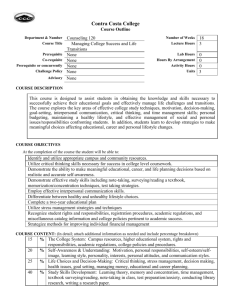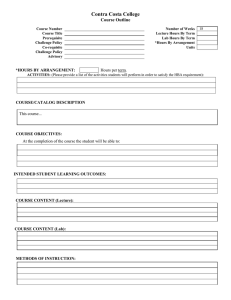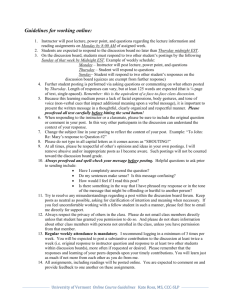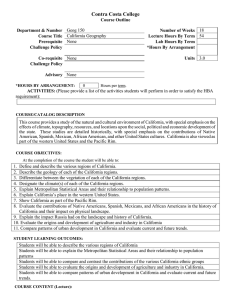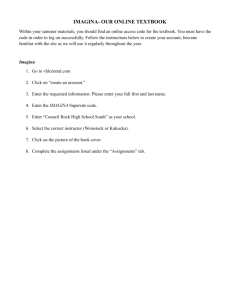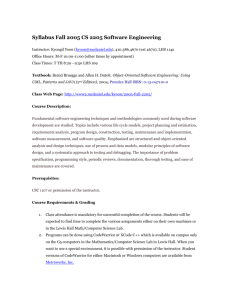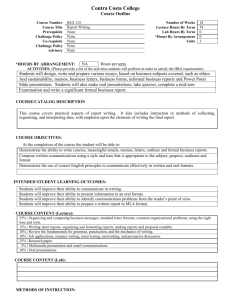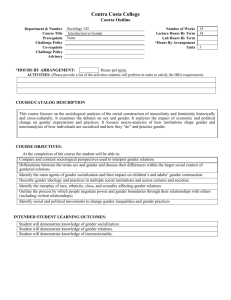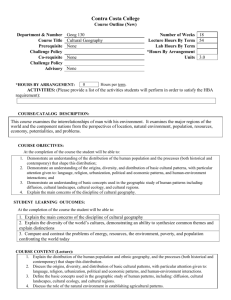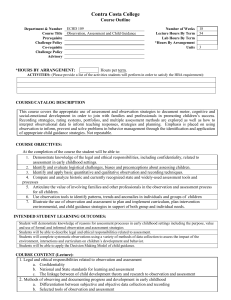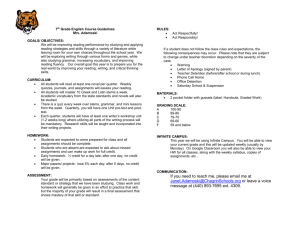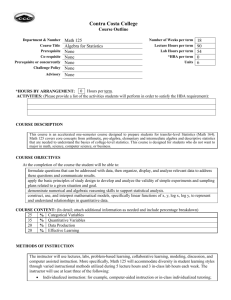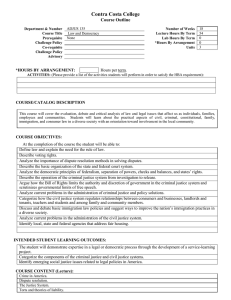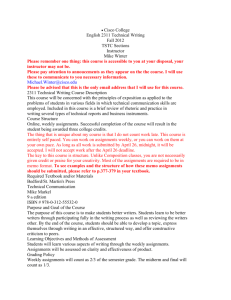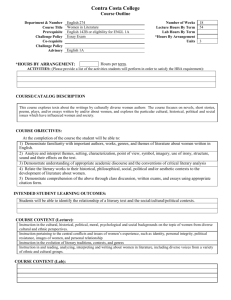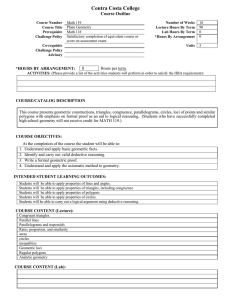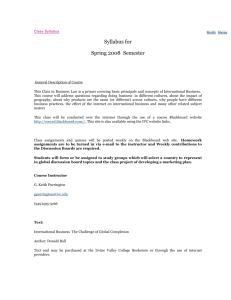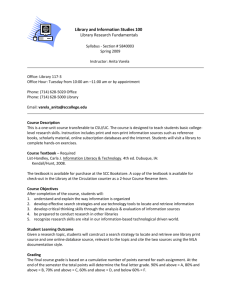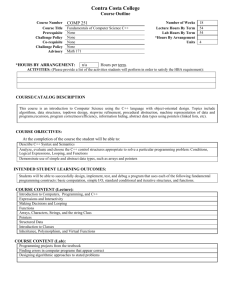Course syllabus ()
advertisement
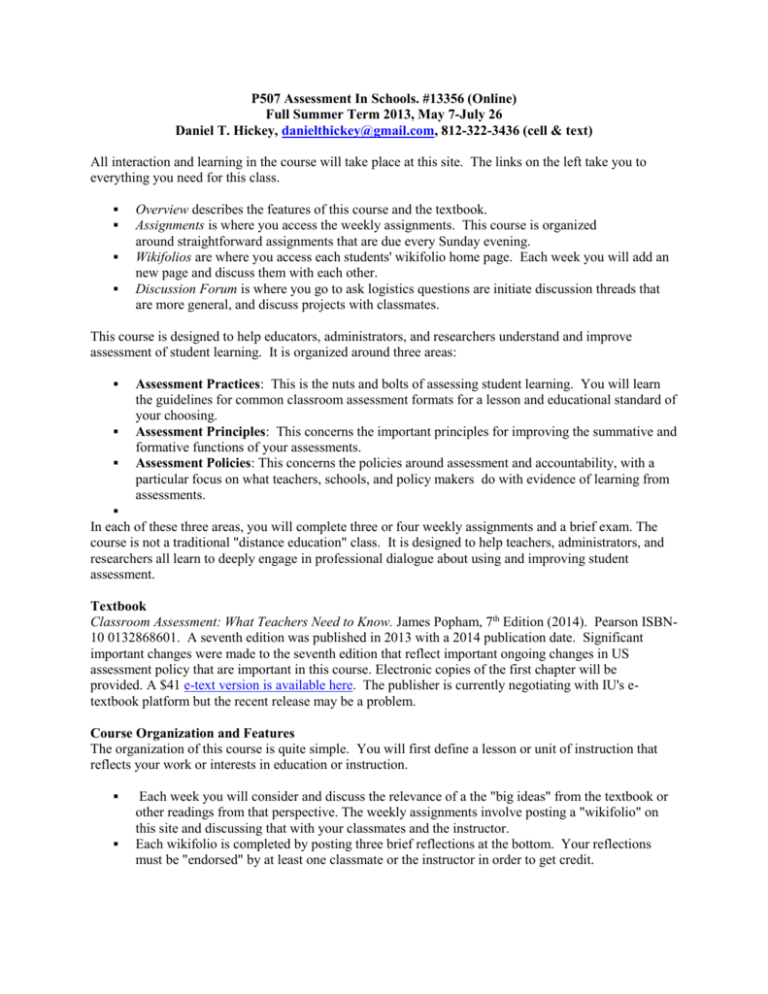
P507 Assessment In Schools. #13356 (Online) Full Summer Term 2013, May 7-July 26 Daniel T. Hickey, danielthickey@gmail.com, 812-322-3436 (cell & text) All interaction and learning in the course will take place at this site. The links on the left take you to everything you need for this class. Overview describes the features of this course and the textbook. Assignments is where you access the weekly assignments. This course is organized around straightforward assignments that are due every Sunday evening. Wikifolios are where you access each students' wikifolio home page. Each week you will add an new page and discuss them with each other. Discussion Forum is where you go to ask logistics questions are initiate discussion threads that are more general, and discuss projects with classmates. This course is designed to help educators, administrators, and researchers understand and improve assessment of student learning. It is organized around three areas: Assessment Practices: This is the nuts and bolts of assessing student learning. You will learn the guidelines for common classroom assessment formats for a lesson and educational standard of your choosing. Assessment Principles: This concerns the important principles for improving the summative and formative functions of your assessments. Assessment Policies: This concerns the policies around assessment and accountability, with a particular focus on what teachers, schools, and policy makers do with evidence of learning from assessments. In each of these three areas, you will complete three or four weekly assignments and a brief exam. The course is not a traditional "distance education" class. It is designed to help teachers, administrators, and researchers all learn to deeply engage in professional dialogue about using and improving student assessment. Textbook Classroom Assessment: What Teachers Need to Know. James Popham, 7th Edition (2014). Pearson ISBN10 0132868601. A seventh edition was published in 2013 with a 2014 publication date. Significant important changes were made to the seventh edition that reflect important ongoing changes in US assessment policy that are important in this course. Electronic copies of the first chapter will be provided. A $41 e-text version is available here. The publisher is currently negotiating with IU's etextbook platform but the recent release may be a problem. Course Organization and Features The organization of this course is quite simple. You will first define a lesson or unit of instruction that reflects your work or interests in education or instruction. Each week you will consider and discuss the relevance of a the "big ideas" from the textbook or other readings from that perspective. The weekly assignments involve posting a "wikifolio" on this site and discussing that with your classmates and the instructor. Each wikifolio is completed by posting three brief reflections at the bottom. Your reflections must be "endorsed" by at least one classmate or the instructor in order to get credit. The exams assess the extent to which you have taken away enduring understanding of those ideas. It consists of items drawn from the publishers item bank and assess the content of the chapter. Extra credit is offered for assembling the weekly wikifolios into a finished paper. For many students, this paper can represent a significant contribution to assessment in their particular domain. It may initially be worthy of presentation and may eventually be worthy of publication. Deadlines In order to foster discussion and keep students from getting behind, the weekly deadline of Sunday 8PM EST for posting your draft wikifolios is strictly enforced. You will lose one point per day each day you are late. If you have a documented excuse for being late, you must mail or email the documentation to the instructor,and the documentation must include a phone number which can be used for verification purposes. Grading The eleven graded wikifolios are each worth five points (55 points total). Each of the three exams is worth 15 points (45 points total). The optional term paper is worth up to 20 points. Grades are assigned as follows: 100+ points =A+; 90-99 points = A, 80-89 = B, 70-79 points = C, 60-69 points = D. Technology This format has been refined over several years and has proven very efficient and productive. The only thing that is new about this course this semester is the textbook edition and the fact that is using Google sites rather than OnCourse. This is all relatively low tech class and is easier to use and navigate than OnCourse. We may switch everything over to the even more user-friendly Google Coursebuilder once it is ready for use, but only if the transition is seamless. As an added bonus, by taking this class you will learn much of what you need to know to set up a similar site of your own if you wish to. Schedule
